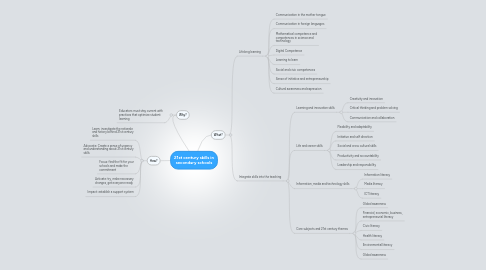
1. Why?
1.1. Educators must stay current with practices that optimize student learning
2. How?
2.1. Learn: investigate the rationale and history behind 21st century skills
2.2. Advocate: Create a sense of urgency and understanding about 21st century skills
2.3. Focus: find the fit for your schools and make the commitment
2.4. Activate: try, make necessary changes, get everyone ready
2.5. Impact: establish a support system
3. What?
3.1. Lifelong learning
3.1.1. Communication in the mother tongue
3.1.2. Communication in foreign languages
3.1.3. Mathematical competence and competences in science and technology
3.1.4. Digital Competence
3.1.5. Learning to learn
3.1.6. Social and civic competences
3.1.7. Sense of initiative and entrepreneurship
3.1.8. Cultural awareness and expression
3.2. Integrate skills into the teaching
3.2.1. Learning and innovation skills
3.2.1.1. Creativity and innovation
3.2.1.2. Critical thinking and problem solving
3.2.1.3. Communication and collaboration
3.2.2. Life and career skills
3.2.2.1. Flexibility and adaptability
3.2.2.2. Initiative and self direction
3.2.2.3. Social and cross cultural skills
3.2.2.4. Productivity and accountability
3.2.2.5. Leadership and responsibility
3.2.3. Information, media and technology skills
3.2.3.1. Information literacy
3.2.3.2. Media literacy
3.2.3.3. ICT literacy
3.2.4. Core subjects and 21st century themes
3.2.4.1. Global awareness
3.2.4.2. Financial, economic, business, entrepreneurial literacy
3.2.4.3. Civic literacy
3.2.4.4. Health literacy
3.2.4.5. Environmental literacy
3.2.4.6. Global awareness

